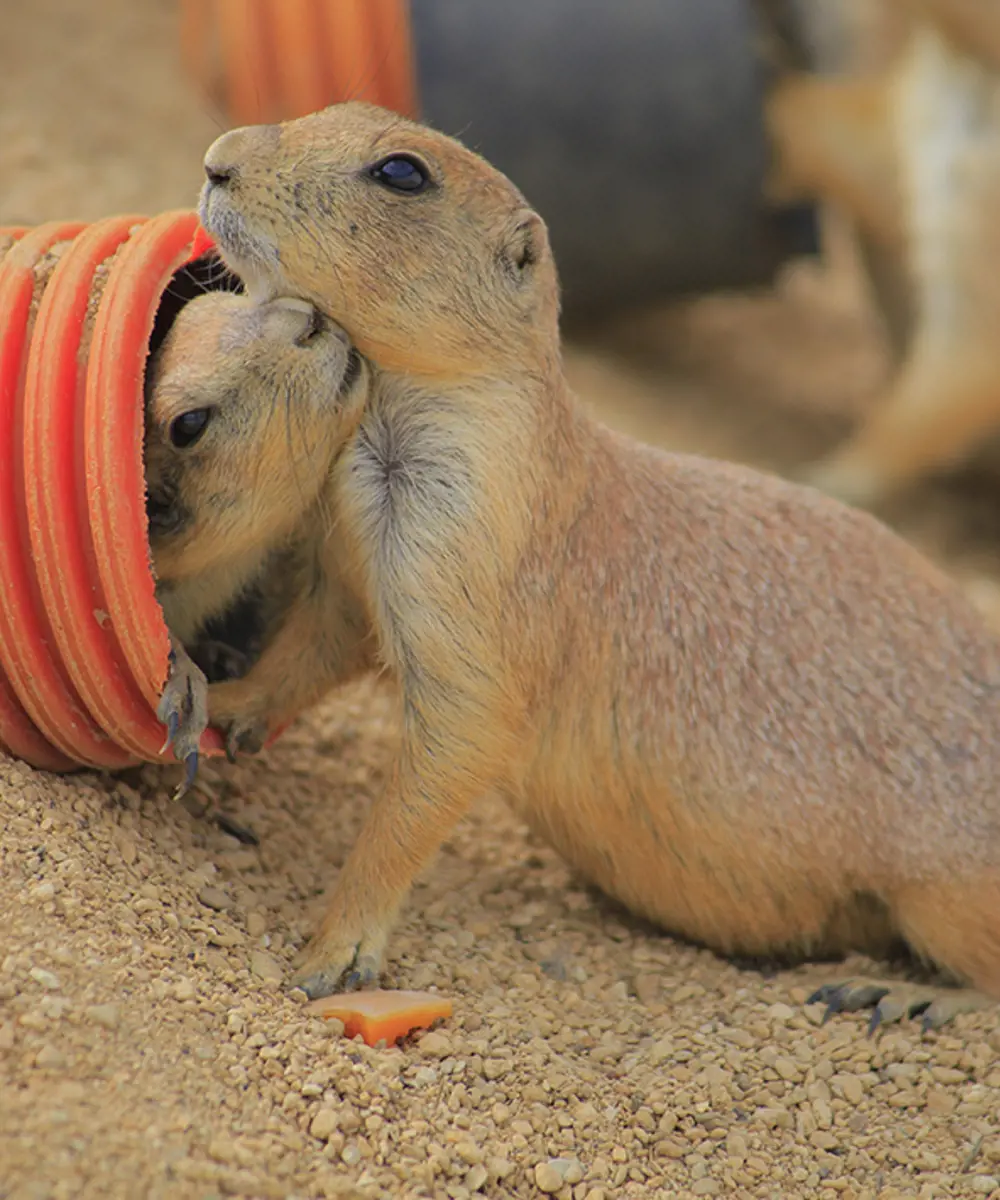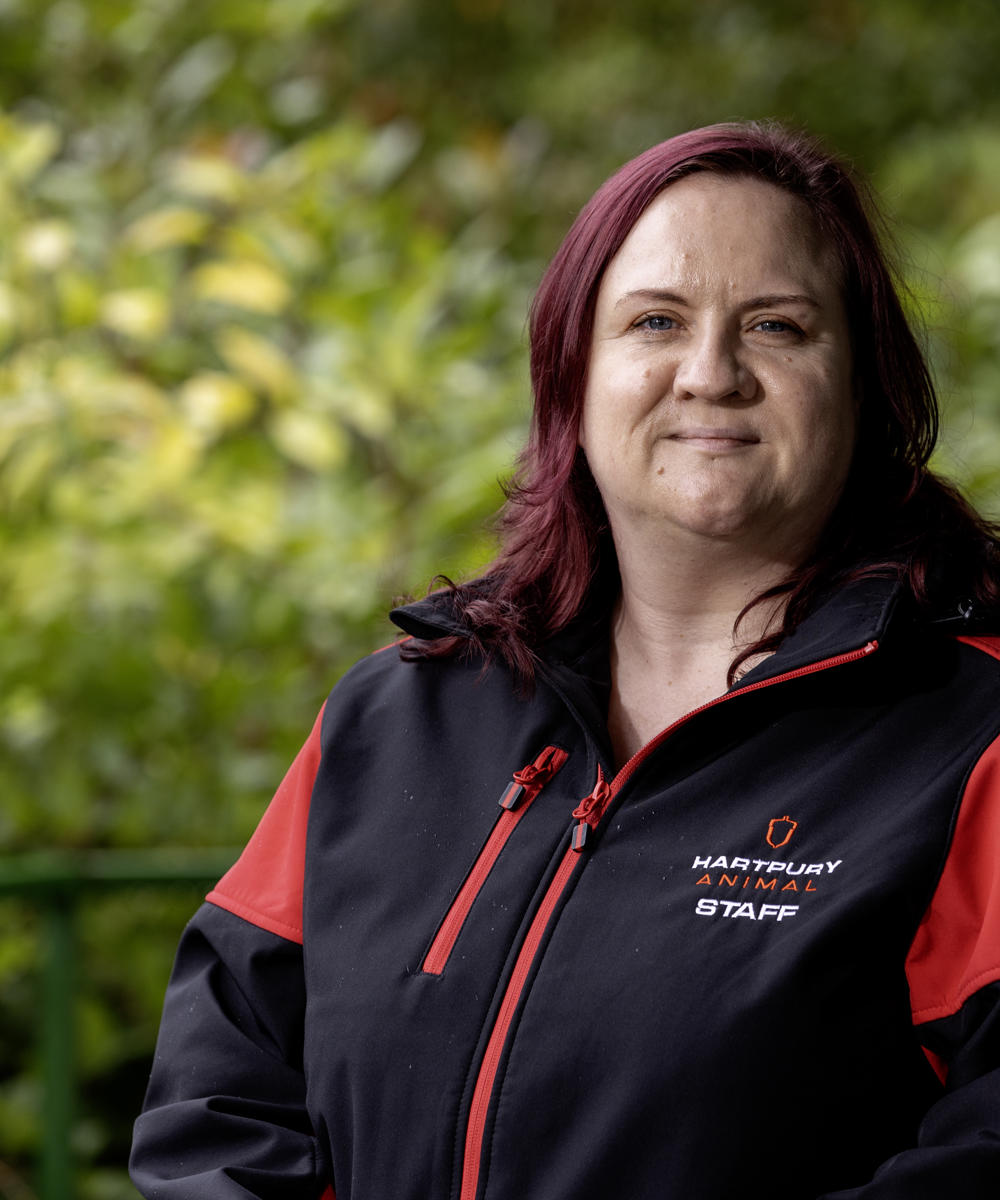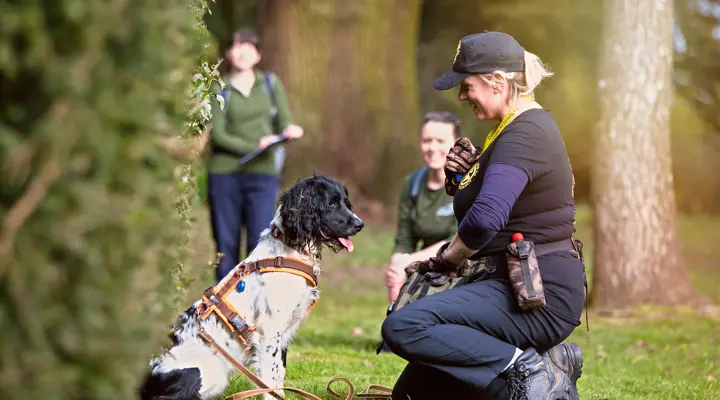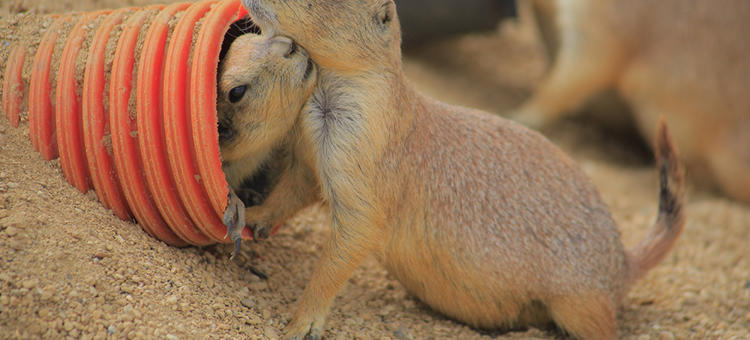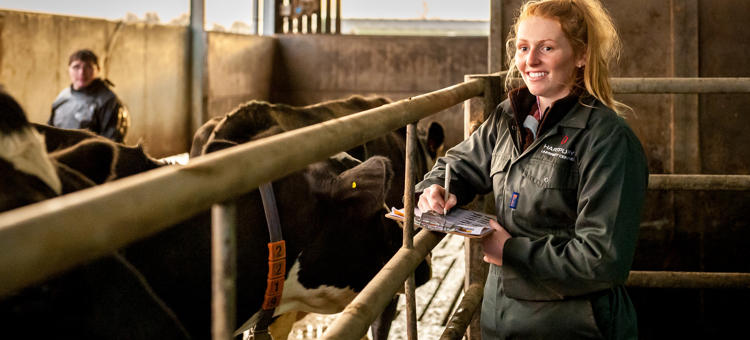Course information
Change where it matters
Supported by our academic and industry experts, you’ll challenge your understanding of a range of topics and explore the interface between ethics and science.
You’ll understand how theory is implemented in welfare assessment using the latest technological innovation, but also works within time and cost constraints.
Influence the future
By developing the written and verbal skills to communicate complex concepts to different audiences, you’ll be empowered to influence perceptions and organisational decision-making, enact change and improve industry practices.
Many of our on campus learning facilities are successful commercial businesses, while our strong industry connections will also enhance your experience as you extend your professional networks.
Advance your studies your way
You’ll have access to our lecturers' expertise and world-class facilities for both practical activities and research projects.
With both full and part-time learning options available, you can choose a pathway to fit around your commitments.
Academic
2:1 honours degree in a relevant subject. Students with 2:2 and relevant experience will be considered on a case by case basis.
Non-academic
Students with non-relevant qualifications but with sufficient work experience or professional experience will be considered on an individual basis.
International
In addition to the academic qualification an IELTS 6.5 or equivalent is required.
Please contact us for further information.
This applied degree will equip graduates for jobs in both commercial and charitable sectors.
Commercial employment
The food production sector, for example, requires those with expertise in animal welfare in order to inform their policy and practice and monitor ongoing compliance.
This is equally true for those external organisations that monitor and confirm welfare standards compliance.
Charitable employment
You’ll be equipped for roles in the charitable sector organisations that are primarily engaged in assuring animal welfare standards, in campaigning for animal welfare, or that actively work in a welfare capacity.
Our compulsory modules will provide high-level analytical skills and knowledge, forming the basis of professional judgement.
Leadership and management roles
By offering leadership / change and resource management modules you’ll be equipped with the skills to take on more strategic roles within organisations.
Our careers team can support you to find and prepare for employment.
Potential graduate destinations include:
- PhD study
- Commercial/charitable animal welfare monitoring and assurance
- Animal rescue, rehabilitation and rehoming/release
- Starting your own business in the animal industry
- Teaching in animal-related subjects
We're committed to supporting you to fulfil your unique potential while you're here so that you can achieve your personal and professional goals. The majority of this course will be delivered on weekdays on-site at Hartpury University, but some of the optional modules will be delivered entirely online.
Duration
One year, full-time
You can study this qualification full-time and subsequently complete within one year.
Two-three years, part-time
Alternatively, we offer flexible part-time options to help students to manage their studies alongside other commitments. These options can be tailored to suit your own needs, enabling you to complete your qualification in two or three years. Please enquire for further details.
Your support network
You'll benefit from a strong support network from day one. This will range from your lecturers, supervisors and personal tutor to our specialist academic (Achievement and Success Centre), employability (Innovation, Careers and Enterprise) and wellbeing teams.
Your learning experiences
You'll experience a range of teaching methods to strengthen your understanding of topics, including lectures, workshops and practical sessions.
Course information
Overview
Change where it matters
Supported by our academic and industry experts, you’ll challenge your understanding of a range of topics and explore the interface between ethics and science.
You’ll understand how theory is implemented in welfare assessment using the latest technological innovation, but also works within time and cost constraints.
Influence the future
By developing the written and verbal skills to communicate complex concepts to different audiences, you’ll be empowered to influence perceptions and organisational decision-making, enact change and improve industry practices.
Many of our on campus learning facilities are successful commercial businesses, while our strong industry connections will also enhance your experience as you extend your professional networks.
Advance your studies your way
You’ll have access to our lecturers' expertise and world-class facilities for both practical activities and research projects.
With both full and part-time learning options available, you can choose a pathway to fit around your commitments.
Entry requirements
Academic
2:1 honours degree in a relevant subject. Students with 2:2 and relevant experience will be considered on a case by case basis.
Non-academic
Students with non-relevant qualifications but with sufficient work experience or professional experience will be considered on an individual basis.
International
In addition to the academic qualification an IELTS 6.5 or equivalent is required.
Please contact us for further information.
Employability
This applied degree will equip graduates for jobs in both commercial and charitable sectors.
Commercial employment
The food production sector, for example, requires those with expertise in animal welfare in order to inform their policy and practice and monitor ongoing compliance.
This is equally true for those external organisations that monitor and confirm welfare standards compliance.
Charitable employment
You’ll be equipped for roles in the charitable sector organisations that are primarily engaged in assuring animal welfare standards, in campaigning for animal welfare, or that actively work in a welfare capacity.
Our compulsory modules will provide high-level analytical skills and knowledge, forming the basis of professional judgement.
Leadership and management roles
By offering leadership / change and resource management modules you’ll be equipped with the skills to take on more strategic roles within organisations.
Our careers team can support you to find and prepare for employment.
Potential graduate destinations include:
- PhD study
- Commercial/charitable animal welfare monitoring and assurance
- Animal rescue, rehabilitation and rehoming/release
- Starting your own business in the animal industry
- Teaching in animal-related subjects
How you'll study
We're committed to supporting you to fulfil your unique potential while you're here so that you can achieve your personal and professional goals. The majority of this course will be delivered on weekdays on-site at Hartpury University, but some of the optional modules will be delivered entirely online.
Duration
One year, full-time
You can study this qualification full-time and subsequently complete within one year.
Two-three years, part-time
Alternatively, we offer flexible part-time options to help students to manage their studies alongside other commitments. These options can be tailored to suit your own needs, enabling you to complete your qualification in two or three years. Please enquire for further details.
Your support network
You'll benefit from a strong support network from day one. This will range from your lecturers, supervisors and personal tutor to our specialist academic (Achievement and Success Centre), employability (Innovation, Careers and Enterprise) and wellbeing teams.
Your learning experiences
You'll experience a range of teaching methods to strengthen your understanding of topics, including lectures, workshops and practical sessions.
Qualification and modules
This degree focuses on the scientific understanding of animal behaviour and welfare and how this is applied practically to real-life situations.
Study the key elements of animal welfare science, including the legal structures and scientific concepts applied to a variety of modern contexts. Explore philosophical and ethical frameworks, employ the principles and methodologies of observing and understanding animal behaviour.
You’ll utilise your expertise to develop innovative approaches to assessing animal welfare in real-world contexts. This will marry the conceptual science against the constraints, compromises and difficulties of safeguarding animal wellbeing in real-world practice.
Your dissertation project will allow you to research an area of your own interest in relation to animal behaviour and / or welfare, under the guidance of one of our industry-leading research-active lecturers.
Studying a postgraduate certificate or diploma is ideal for those who want to complete a specific part of this master’s degree, without the academic research. In particular, this may suit people who are working in a specific industry and just want to focus on that one area for their study.
The postgraduate diploma includes all of the specialist modules without completion of a research dissertation. The postgraduate certificate includes the modules focusing on animal behaviour, welfare, ethics and welfare assessment. Please view the specific module breakdown for further details.
Analyse contemporary areas of welfare concern including evidence for sentience and positive welfare states. Explore appropriate solutions to overcoming the barriers to improving animal welfare in the real world.
Explore recent advances in the field of animal behaviour, including the areas of cognition, personality, social behaviour, and communication.
Evaluate the differing philosophical frameworks that govern why we are concerned for the lives and lived experiences of non-human animals. You’ll further understand how these frameworks have been applied in real-life contexts.
You'll bring together your understanding of ethical frameworks, animal welfare science, and animal behaviour measurement. You will then be able to navigate the complexities of assessing animal welfare in the real world.
You'll contextualise your understanding of behaviour and welfare to animals kept as companions (e.g. dogs, cats, horses), exploring how variation in the human-animal bond has impacted on their welfare. Furthermore, you'll explore how animal welfare can be practically assessed and positive changes enacted in these real-world contexts.
Discuss research methodologies and applications, as well as strengths, weaknesses and limitations of different methods.
Regulating Agriculture and Food Production (Online module. MSc and PGDip) (15 credits)
Focus on the most relevant policies and legislative items that relate to agriculture and food production. These will include a range of topics such as transport, slaughter and disease control as well as looking at management of a variety of farmed species.
Companion and Working Animal Regulations (Online module. MSc and PGDip) (15 credits)
Explore the industries for companion animals and equines, covering a range of topics, from how animals are sourced (e.g. pet shops and breeders) to their use in sporting disciplines, therapy animals, animals in education and military / police animals.
Develop and implement a research project with the support of an individual supervisor to guide and support you to undertake this innovative piece of research.
Qualification and modules
MSc degree
This degree focuses on the scientific understanding of animal behaviour and welfare and how this is applied practically to real-life situations.
Study the key elements of animal welfare science, including the legal structures and scientific concepts applied to a variety of modern contexts. Explore philosophical and ethical frameworks, employ the principles and methodologies of observing and understanding animal behaviour.
You’ll utilise your expertise to develop innovative approaches to assessing animal welfare in real-world contexts. This will marry the conceptual science against the constraints, compromises and difficulties of safeguarding animal wellbeing in real-world practice.
Your dissertation project will allow you to research an area of your own interest in relation to animal behaviour and / or welfare, under the guidance of one of our industry-leading research-active lecturers.
Postgraduate Certificate and Postgraduate Diploma
Studying a postgraduate certificate or diploma is ideal for those who want to complete a specific part of this master’s degree, without the academic research. In particular, this may suit people who are working in a specific industry and just want to focus on that one area for their study.
The postgraduate diploma includes all of the specialist modules without completion of a research dissertation. The postgraduate certificate includes the modules focusing on animal behaviour, welfare, ethics and welfare assessment. Please view the specific module breakdown for further details.
Compulsory modules
Analyse contemporary areas of welfare concern including evidence for sentience and positive welfare states. Explore appropriate solutions to overcoming the barriers to improving animal welfare in the real world.
Explore recent advances in the field of animal behaviour, including the areas of cognition, personality, social behaviour, and communication.
Evaluate the differing philosophical frameworks that govern why we are concerned for the lives and lived experiences of non-human animals. You’ll further understand how these frameworks have been applied in real-life contexts.
You'll bring together your understanding of ethical frameworks, animal welfare science, and animal behaviour measurement. You will then be able to navigate the complexities of assessing animal welfare in the real world.
You'll contextualise your understanding of behaviour and welfare to animals kept as companions (e.g. dogs, cats, horses), exploring how variation in the human-animal bond has impacted on their welfare. Furthermore, you'll explore how animal welfare can be practically assessed and positive changes enacted in these real-world contexts.
Discuss research methodologies and applications, as well as strengths, weaknesses and limitations of different methods.
Regulating Agriculture and Food Production (Online module. MSc and PGDip) (15 credits)
Focus on the most relevant policies and legislative items that relate to agriculture and food production. These will include a range of topics such as transport, slaughter and disease control as well as looking at management of a variety of farmed species.
Companion and Working Animal Regulations (Online module. MSc and PGDip) (15 credits)
Explore the industries for companion animals and equines, covering a range of topics, from how animals are sourced (e.g. pet shops and breeders) to their use in sporting disciplines, therapy animals, animals in education and military / police animals.
Develop and implement a research project with the support of an individual supervisor to guide and support you to undertake this innovative piece of research.
The modules contain a mixture of scheduled learning – lectures, online learning and workshops – alongside independent learning. Students are expected to dedicate at least two to three hours of independent study per contact hour.
| Contact learning | Placement learning | Independent learning | |
| MSc degree | 12% | 0% | 88% |
| Postgraduate Diploma | 17% | 0% | 83% |
| Postgraduate Certificate | 16% | 0% | 84% |
Teaching contact time
Teaching contact time and method will vary depending on the module that you are studying.
You’ll be assessed through a mixture of written exams, practical exams and written assignments. Many of the modules will be marked based on a mixture of assessment types, whilst others will be based solely on one type of assessment. Feedback will be given in written form, with the option to discuss all feedback with academic staff.
| Written exam | Practical exam | Coursework | |
| MSc | 0% | 33% | 67% |
| Postgraduate Diploma |
0% |
38% | 62% |
| Postgraduate Certificate | 0% | 25% | 75% |
This course is made up of three teaching blocks. Semesters normally consist of 12 weeks of scheduled teaching and then assessment weeks, with an overview below:
- On-site teaching will generally be on Wednesday and Friday afternoons.
- Some modules will be taught entirely online, with some pre-recorded materials and some online sessions on a Friday
- Taught modules will normally be completed by the end of semester two, with the dissertation being undertaken during semester three
- Attendance dates and timetables are available before enrolment to support the arrangement of annual leave where required
Please visit our student finance page for information on tuition fees and student loans, as well as non-repayable grants, bursaries and scholarships, eligible to different groups, to support with study costs.
Clothing and footwear (circa £100)
A number of modules require clothing and footwear suitable to wear outdoors when working with animals, eg. long trousers and boots.
Hartpury University branded clothing is also available through our online shop, for those who wish to purchase it. However, this is not essential.
Accommodation and living costs
Please visit our student accommodation page for details.
Our Resource Library is where you'll find all the essential details about Hartpury University's courses. It includes Programme and Module Specifications, along with Course Information Sheets for every course. You can easily download a complete revision history for each of these, clearly showing the dates changes were made.
Course Information Sheets: These are PDF versions of the course webpages. They provide an overview of the course, what to expect during your studies, and the topics covered.
Programme Specifications: These are detailed, validated documents containing academic specifics for each programme. They include descriptions of the programme, its aims, learning outcomes, year and module structure, as well as teaching, learning, and assessment strategies.
Module Specifications: Each Programme consists of several Modules. Our Module Specifications outline the topics covered and the expected outcomes for students studying each Module.
It's a good idea to think about fees and funding around your course as early as you can. We can help you to understand and take control of your finances. Here’s everything you need to know at a glance.

Our specialist facilities match our specialist nature. Students benefit from access to some of the most advanced facilities in the world at an educational institution.

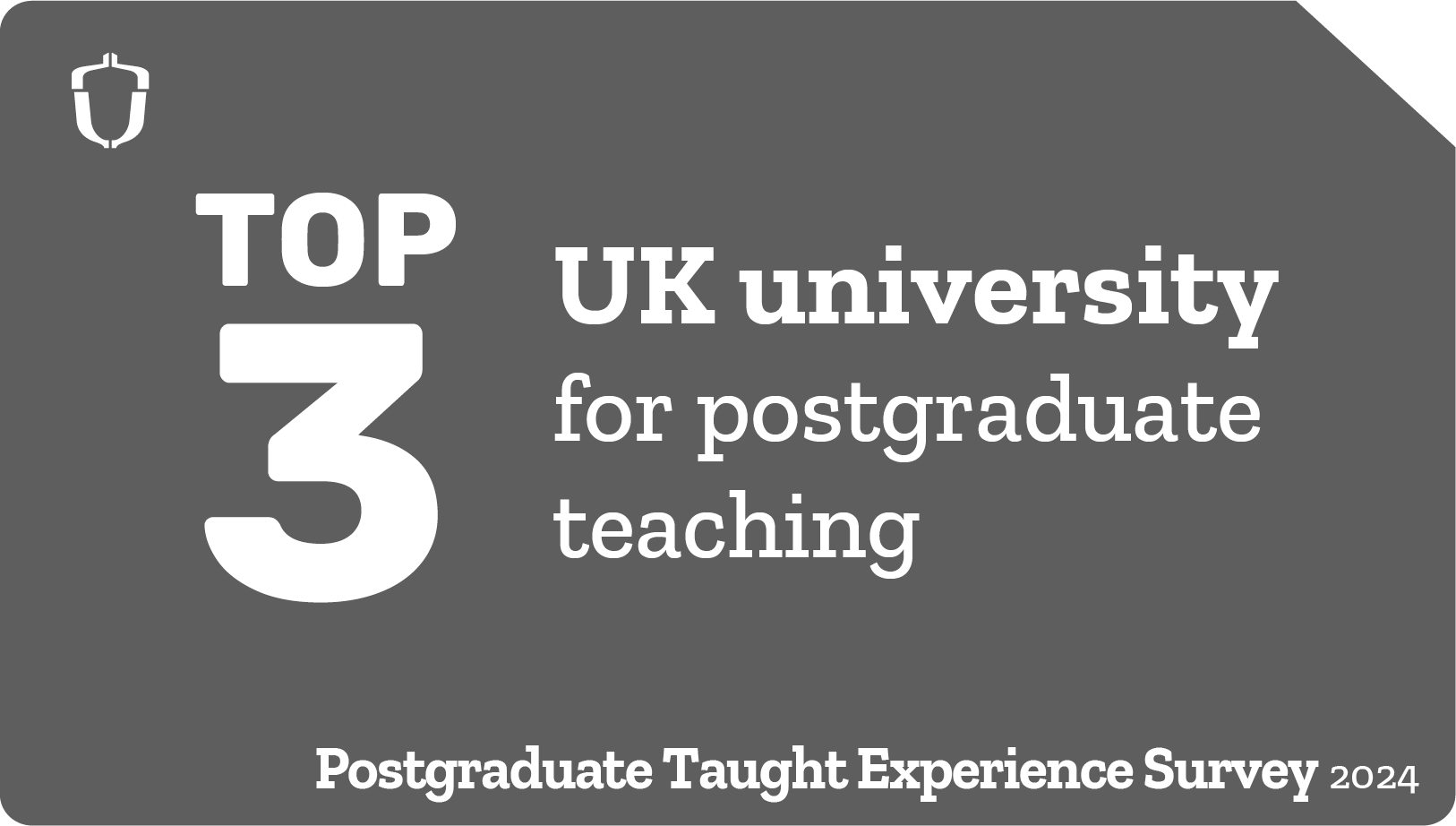
Top 3 UK University
We're a top 3 UK university for postgraduate teaching, and top 5 UK university for overall postgraduate satisfaction (PTES 2024).

World leading
Our research has been recognised as 'world-leading' and 'internationally excellent' (Research Excellence Framework 2021).
Get in touch
Important information
Every effort has been made to ensure the accuracy of our published course information, however our programmes are reviewed and developed regularly. Changes or cancellation of courses may be necessary to ensure alignment with emerging employment areas, to comply with accrediting body requirements, revisions to subject benchmark statements or as a result of student feedback. We reserve the right to make necessary changes and will notify all offer-holders of changes as and when they occur.

